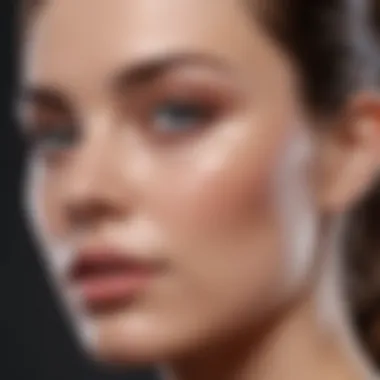Top Moisturizers for Aging Skin at Sephora


Intro
Aging skin presents unique challenges that necessitate tailored skincare solutions. As women age, skin undergoes significant changes. Common concerns include dryness, reduced elasticity, and the appearance of fine lines and wrinkles. Thus, selecting the right moisturizer at Sephora becomes crucial.
In this article, we will explore the best moisturizers available at Sephora, focusing on key ingredients, product recommendations, and expert insights. This guide aims to assist readers in making informed choices based on their individual skin type and specific aging concerns. By understanding what moisturizers can offer for aging skin, one can enhance their skincare routine effectively.
Understanding Aging Skin
Aging skin presents distinct challenges that require specific attention in skincare routines. Understanding aging skin is pivotal. This knowledge informs our choices in moisturizers, guiding us toward products that effectively address mature skin's unique needs. When we comprehend how skin changes over time, we become more skilled at selecting appropriate treatments.
Skin aging is a complex process influenced by various factors. This section elucidates the mechanisms behind skin aging. It also explores common indicators that signal the need for improved moisture and nourishment.
By equipping ourselves with this understanding, we can better appreciate the importance of moisturization and the role it plays in maintaining skin health.
The Science of Skin Aging
Skin aging involves biological and environmental factors. The outer layer of skin, called the epidermis, becomes thinner with age. Additionally, the production of collagen and elastin declines. Collagen provides structure, while elastin allows skin to stretch and recover. As these proteins diminish, skin loses firmness.
Further, the skin's moisture retention capabilities decrease, largely due to a drop in hyaluronic acid. Reduced moisture can lead to dryness and a rough texture. The skin also faces cumulative damage from environmental stressors such as UV radiation and pollution. This damage leads to premature aging, known as photoaging.
An understanding of these processes is essential. It allows consumers to choose products that can combat these changes effectively.
Common Signs of Aging
There are several recognizable signs of aging skin. Fine lines and wrinkles often appear first, particularly around eyes and mouth. Skin may also develop sagging, causing a tired look. Additionally, age spots, also known as liver spots, can manifest due to prolonged sun exposure.
Another notable change is the skin's texture. It may become uneven or develop a dull appearance. These variations often require more intensive moisturizing and treatment for optimal appearance.
Awareness of these signs can lead to proactive skincare habits, minimizing their visibility and impact.
Factors Contributing to Skin Aging
A multitude of factors influence the aging of skin. Genetics plays a foundational role, dictating inherent skin type and elasticity. However, lifestyle factors should not be overlooked.
- Sun Exposure: Chronic exposure to UV rays accelerates skin aging by breaking down collagen.
- Smoking: Nicotine constricts blood vessels, impairing circulation and leading to a dull complexion.
- Diet: Poor nutritional choices can deprive skin of necessary vitamins and antioxidants.
- Hydration: Inadequate water intake results in dryness and a lack of flexibility in the skin.
Recognizing these factors is crucial for developing effective skincare strategies that combat aging.
The Role of Moisturizers in Skincare
In the realm of skincare, moisturizers hold a crucial position, especially when addressing the unique needs of aging skin. Aging skin can often become dehydrated, leading to a loss of elasticity and the development of fine lines and wrinkles. Thus, understanding the integral role of moisturizers is essential for any skincare routine aimed at enhancing skin health and appearance.
Moisturizers serve to maintain optimal skin hydration. They create a barrier that helps to retain water, preventing moisture loss. This function is particularly significant as skin tends to lose its natural moisture with age. Keeping the skin well-hydrated not only improves its texture but also enhances its overall resilience.
The effectiveness of moisturizers depends largely on their components. Ingredients such as humectants attract water, while occlusives seal in moisture, and emollients smooth the skin surface. Therefore, selecting the right moisturizer that combines these properties can substantially benefit aging skin, improving its hydration levels.
Another important aspect of moisturizers is that they can help to strengthen the skin's protective barrier. This is crucial in preventing external irritants from penetrating and causing further damage. A well-formulated moisturizer contributes to the skin's defense mechanism, which is vital for aging skin that may be more sensitive and prone to irritation.
Moreover, the application of moisturizers can be a soothing practice that promotes mindfulness in one's skincare routine. It can enhance the user's overall experience, turning a routine task into a moment of self-care and attention to personal well-being.
Criteria for Selecting Effective Moisturizers
Selecting the right moisturizer for aging skin involves careful evaluation of several key factors. Such choices directly affect skin health, texture, and overall appearance. The process transcends mere purchase; it requires an understanding of individual skin needs, active ingredients, and product formulation. This section emphasizes the significance of each criterion, providing a roadmap to select moisturizers that not only hydrate but also rejuvenate aging skin effectively.
Ingredient Analysis
Ingredients play a critical role in the efficacy of moisturizers. Certain compounds have demonstrated benefits for aging skin. Key ingredients include:


- Hyaluronic Acid: Known for its exceptional hydration properties, it attracts moisture and helps maintain skin elasticity.
- Retinol: A derivative of Vitamin A, retinol promotes cell turnover, reducing the appearance of fine lines and wrinkles.
- Peptides: These amino acid chains enhance collagen production, which is vital as the skin loses its firmness over time.
- Antioxidants: Ingredients like Vitamin C combat oxidative stress and prevent further skin aging.
A thorough ingredient analysis is crucial. Reading labels becomes necessary. A product rich in beneficial components can significantly improve skin texture and hydration.
Skin Type Considerations
Understanding your skin type is fundamental when selecting a moisturizer. Aging skin can exhibit different characteristics depending on whether it is dry, oily, or combination. For instance, dry skin requires heavier, more emollient formulations to lock in moisture. Oily skin, on the other hand, may respond better to lighter, gel-based moisturizers that provide hydration without excess oil.
Some considerations for skin type include:
- Dry Skin: Look for products containing ceramides and oils to provide added moisture and barrier protection.
- Oily Skin: Gel moisturizers with water-based formulations can hydrate without clogging pores.
- Combination Skin: A balance of both heavy and light formulations might be required, focusing on areas where the skin appears drier.
Evaluating personal skin characteristics enhances product selection.
Product Formulation
The overall formulation of a moisturizer is another essential criterion. This encompasses texture, absorption rate, and the presence of preservatives. A well-formulated moisturizer should absorb easily without leaving a greasy residue. Additionally, a product devoid of harsh chemicals minimizes the risk of irritation, especially for aging skin, which can be more sensitive.
When analyzing formulation:
- Non-comedogenic: Ensure the product does not block pores, which is vital for any skin type.
- pH Balanced: A balanced pH supports skin health and maintains barrier function.
- Free from Parabens and Sulfates: These can be harsh and irritating, particularly for mature skin.
In sum, understanding these criteria for selecting effective moisturizers provides a structured approach to skincare. Assessing ingredients, skin type, and formulation leads to informed choices, ultimately promoting healthier, more resilient skin.
"A well-informed selection process not only benefits the skin but also instills confidence in the use of the product."
By keeping these factors in mind, one can navigate the myriad of options at Sephora for a suitable moisturizer that addresses aging skin's unique requirements.
Key Ingredients for Aging Skin
In this section, we explore the crucial components in moisturizers that cater to aging skin. Key ingredients can significantly influence the effectiveness of a product, optimizing hydration while addressing specific concerns like fine lines and skin texture. Choosing moisturizers with appropriate ingredients can lead to visible improvements and the overall health of aging skin. We will delve into the benefits and dynamics of four essential elements: Hyaluronic Acid, Retinol, Peptides, and Antioxidants.
Hyaluronic Acid
Hyaluronic Acid is a naturally occurring substance in the skin that holds moisture. Its ability to retain water makes it a vital ingredient in moisturizers targeted at aging skin. When applied, it can attract moisture from the environment and bind it to the skin, helping to maintain hydration levels. As we age, our skin's natural hyaluronic acid levels decrease, contributing to dryness and loss of elasticity. Therefore, including this ingredient in skincare can lead to plumper, more hydrated skin.
Benefits of Hyaluronic Acid include:
- Intense Hydration: It can hold up to 1000 times its weight in water, providing deep moisture.
- Reduction of Fine Lines: Hydrated skin appears more youthful and plump, minimizing the visibility of wrinkles.
- Enhanced Skin Barrier: It aids in strengthening the skin’s moisture barrier, providing resilience against environmental stressors.
Retinol
Retinol, a derivative of Vitamin A, is arguably one of the most effective ingredients for aging skin. Known primarily for its anti-aging effects, Retinol increases cell turnover, prompting the skin to shed dead cells and regenerate new ones. This process enhances skin texture and tone while diminishing the appearance of fine lines and deeper wrinkles.
Some key considerations about Retinol include:
- Irritation Potential: While effective, it can cause irritation, especially in sensitive skin. Introducing it gradually is often recommended.
- Photoprotection Requirement: Retinol can increase photosensitivity, making sun protection essential during its use.
- Consistency is Key: The best results come with consistent use over time, making a commitment to apply this ingredient a must.
Peptides
Peptides are chains of amino acids that serve as building blocks for proteins in the skin. They play a significant role in stimulating collagen and elastin production, two vital components that maintain skin structure. As skin ages, the natural levels of collagen diminish, leading to sagging and wrinkles. Incorporating peptides into a moisturizer can bolster these levels and improve overall skin elasticity.
The advantages of peptides include:
- Collagen Boosting: They encourage collagen synthesis, promoting firmer skin.
- Improved Skin Barrier: Peptides strengthen the skin barrier, enhancing moisture retention and resistance to external factors.
- Soothing Properties: Many peptides have anti-inflammatory effects, soothing irritated skin and reducing redness.
Antioxidants


Antioxidants are pivotal in combating oxidative stress caused by free radicals. These free radicals can accelerate the aging process, leading to dullness, uneven tone, and wrinkles. Antioxidants neutralize these harmful elements, protecting the skin and promoting a healthier appearance.
Important antioxidant ingredients often found in moisturizers include:
- Vitamin C: Brightens skin and helps even out skin tone.
- Vitamin E: Provides moisture and shields skin from environmental damage.
- Green Tea Extract: Offers anti-inflammatory properties and enhances skin protection.
In summary, knowing the key ingredients in moisturizers for aging skin is essential for making informed skincare choices. By integrating Hyaluronic Acid, Retinol, Peptides, and Antioxidants into daily routines, one can significantly impact the skin's appearance and health.
Sephora’s Noteworthy Moisturizers for Aging Skin
Moisturizers play a crucial role in maintaining the skin's moisture balance and overall health, particularly for aging skin. At Sephora, a range of moisturizers caters to the unique needs of mature skin. This section will explore some of these exceptional products and the specific benefits they offer. The significance of selecting the right moisturizer cannot be understated; it can help improve skin texture, enhance elasticity, and reduce the visibility of fine lines and wrinkles. Here, we will delve into a hands-on approach to understanding what makes each product noteworthy.
Product Overview
Sephora offers an impressive array of moisturizers that support aging skin. These products often feature innovative formulations and effective ingredients aimed at revitalizing the skin. Here are some noteworthy products:
- Clinique Smart Clinical Repair Moisturizer: This moisturizer targets fine lines and wrinkles through its unique blend of peptides and hyaluronic acid. It aims to brighten and firm the skin, providing a smooth appearance.
- Tatcha The Dewy Skin Cream: Known for its rich, nurturing texture, this cream contains a blend of Japanese Purple Rice and other hydrating ingredients that ensures skin retains moisture while providing a radiant glow.
- Drunk Elephant Lala Retro Whipped Cream: This product stands out due to its combination of six African oils and a plant ceramide complex. Together, they help to restore the skin barrier and improve moisture retention, making it ideal for dry and aging skin.
Each of these products reflects how formulation can be tailored to address specific skin concerns, making them relevant options for consumers at Sephora.
Top Picks and Recommendations
When it comes to selecting a moisturizer for aging skin, expert recommendations can be particularly valuable. The following products have been highlighted due to their proven effectiveness and customer satisfaction:
- Elizabeth Arden Advanced Ceramide Capsules: These capsules contain a blend of ceramides and essential fatty acids that support skin barrier function and combat dryness. They are a favorite among users seeking convenience and targeted application.
- Belif The True Cream - Aqua Bomb: This gel-cream is lightweight yet deeply hydrating, making it suitable for those who prefer a non-greasy feel. It helps to maintain hydration levels without weighing down the skin.
- Laneige Water Bank Moisture Cream: Infused with minerals and green mineral water, this moisturizer hydrates and strengthens the skin's moisture barrier.
These products not only receive high ratings but also align with the ingredients deemed effective for aging skin, such as hyaluronic acid and ceramides.
User Reviews and Experiences
User experiences can provide critical insight into the effectiveness of moisturizers. Many consumers at Sephora share their thoughts on how different products work for them. Common themes found in reviews include:
- Hydration Levels: Many users report significant improvements in hydration, citing less dryness and a plumper appearance.
- Skin Texture Improvement: Customers frequently note smoother skin and reduced texture issues after consistent use of their chosen moisturizers.
- Regaining Elasticity: Products touted for their anti-aging properties often receive praise for making skin feel firmer and more elastic.
In summary, user feedback is an essential element that helps others make informed decisions. Each review amplifies the understanding of what products may suit different skin types and concerns best.
Application Techniques for Optimal Results
Proper application techniques are essential when using moisturizers, especially for aging skin. Understanding how best to apply these products can significantly enhance their effectiveness. It helps to ensure that your skin receives the maximum benefits from the key ingredients they contain. Following correct application methods leads to better absorption, longevity of effects, and an overall improved skin texture.
Basic Application Steps
- Start with Clean Skin: Always begin with a clean slate. This means washing your face with a gentle cleanser. Choose one that doesn't strip away natural oils but removes impurities.
- Pat Dry: After cleansing, gently pat your skin dry with a clean towel. Avoid rubbing, as that can cause irritation.
- Apply Toner (Optional): If you use toner, apply it at this stage. This can help prep the skin for better absorption of the moisturizer.
- Use the Right Amount: Use a dime-sized amount of moisturizer. Applying too much can lead to product buildup, while too little may not provide enough hydration.
- Gently Massage: Using your fingertips, apply the moisturizer in upward circular motions. This stimulates circulation and encourages absorption.
- Target Problem Areas: Focus on specific areas that may require extra hydration, such as around the eyes or any dry patches.
- Let It Absorb: Allow the moisturizer a few minutes to fully absorb before applying other products, such as makeup or sunscreen.
Layering Products Effectively
Layering skin care correctly can create a barrier that protects and hydrates your skin. Here’s how to layer products effectively:
- Start with Water-Based Products: Begin with lighter, water-based serums or essences. These should go on first to provide hydration and prep the skin for heavier products.
- Follow with Oil-Based Products: If you use an oil, apply it after your water-based products. Oils seal in moisture and prevent water loss.
- Finish with Moisturizer: Use your moisturizer as the final step to lock in all prior layers. It provides a protective barrier.
- Adjust for Seasons: In humid conditions, you may want to use lighter textures. In colder months, consider richer creams to counteract dryness.
Frequency of Use
The frequency of moisturizer application can vary based on individual needs and skin types, but the general recommendations are:
- Daily Use: For most skin types, using a moisturizer twice daily—morning and evening—will yield the best results.
- Post-Cleansing: Always apply moisturizer after cleansing. This routine ensures that your skin maintains optimal hydration levels.
- Adjust According to Skin Needs: If your skin feels tight or appears dry, consider increasing the frequency. Conversely, if you notice any irritation, reduce use and consult a dermatologist if needed.
Important Note: Always patch-test new products to prevent adverse reactions, especially if your skin is sensitive.


Making these application techniques a part of your skincare regimen can greatly enhance the performance of your moisturizer. Aging skin deserves thoughtful care, and using these techniques ensures a more radiant, youthful appearance.
Potential Issues with Moisturizers
When selecting a moisturizer for aging skin, there are several potential issues that users should be aware of. Understanding these challenges is crucial for achieving the best results from skincare products. Moisturizers can greatly benefit skin health, but they may also cause adverse effects for some users. By gaining insights into these potential issues, individuals can make informed decisions regarding their skincare choices and improve their overall skin condition.
Sensitivity and Allergies
Sensitivity and allergies are common concerns when it comes to using moisturizers. Some individuals may react negatively to certain ingredients found in popular products. Common culprits include fragrances, preservatives, and even some beneficial compounds. These reactions can manifest as redness, itching, or irritation. It's vital to conduct a patch test before fully incorporating a new product into your routine.
- Look for products labeled as "hypoallergenic" or "fragrance-free" to minimize risk.
- Ingredients like paraben or sulfates may also lead to unwanted reactions for some people.
- Consulting with a dermatologist can provide guidance tailored to your skin's requirements.
"Always prioritize gentle formulations to protect your skin from potential harm."
Over-Moisturizing
Over-moisturizing is another issue to consider when applying skincare products. While hydration is key for aging skin, excessive application of moisturizers can lead to a range of problems. The skin's natural balance may become disrupted, leading to breakouts or clogged pores. Additionally, overly-layered products can create a greasy feel, which might discourage consistent use.
- Always assess your skin's condition; it may not need continuous application of heavy moisturizers.
- A tailored approach utilizing different products and treatments may offer the best benefits without overwhelming your skin.
- Balance is essential; a single high-quality product may suffice instead of multiple layers of different creams.
Being vigilant about how your skin responds to moisturizers ensures that you maintain a healthy and effective skincare routine.
Lifestyle Factors in Skincare
The condition of your skin is not solely determined by the products you apply. Lifestyle factors play a crucial role in the overall health of your skin. Understanding this relationship can lead to more effective skincare routines, especially for aging skin. Factors such as diet, hydration, sun exposure, and daily maintenance strongly influence skin vitality and resilience. By focusing on these elements, you can better support your choice of moisturizers and enhance their benefits.
Diet and Hydration
Diet significantly impacts skin health. Nutrient-rich foods provide essential vitamins and minerals that support skin function. For instance, foods high in omega-3 fatty acids, such as salmon and walnuts, can help maintain skin elasticity. Similarly, fruits and vegetables rich in antioxidants—like berries and leafy greens—help combat free radicals that accelerate skin aging.
Hydration is equally important. Drinking adequate water helps keep your skin plump and hydrated. Dehydrated skin tends to look dull and may emphasize fine lines and wrinkles. As a rule of thumb, aim for at least eight glasses of water per day, and incorporate hydrating foods like cucumbers and oranges into your meals. This not only aids in skin appearance but also supports overall health.
Sun Protection
Exposure to ultraviolet (UV) rays is one of the leading causes of premature aging. Regular use of broad-spectrum sunscreen can protect your skin from harmful UV radiation. Look for a sunscreen with at least SPF 30, applying it generously every day, even when it is cloudy outside. Reapplication every two hours is crucial for prolonged sun exposure.
Moreover, wearing protective clothing, hats, and sunglasses during peak sunlight hours further safeguards your skin. Making sun protection a non-negotiable part of your routine will significantly reduce the visible signs of aging and maintain your skin's integrity.
"Effective sun protection can prevent up to 90% of photoaging, allowing your skin to maintain its youthful appearance longer."
Routine Maintenance
A consistent skincare routine is fundamental to preserving skin health as you age. Incorporating a few basic steps can ensure that your skin remains clean and adequately cared for. Start with a gentle cleanser to remove dirt and makeup daily, followed by a suitable toner to balance skin pH.
Moreover, integrating targeted treatments—such as serums containing retinol or vitamin C—can enhance your moisturizer’s effectiveness. Nighttime routines are also essential; using richer moisturizers or overnight masks can aid skin repair during sleep. Regular exfoliation, ideally once a week, helps eliminate dead skin cells, paving the way for better absorption of other products.
Culmination
In this article, we explored the complexities of aging skin and the essential role moisturizers play in maintaining its health and appearance. Understanding the unique requirements of aging skin is imperative for making informed decisions about skincare products.
Moisturizers specifically designed for aging skin can address concerns such as dryness, fine lines, and uneven texture. They often contain key ingredients like hyaluronic acid, retinol, and peptides. These components not only hydrate but also promote skin elasticity, enhance cell turnover, and provide antioxidant protection.
Summarizing Key Points
The discussion highlighted several crucial points:
- Understanding Aging Skin: Recognizing how skin changes over time helps in selecting suitable products.
- The Role of Moisturizers: Moisturizers are vital for hydration and barrier protection, crucial for aging skin.
- Key Ingredients: Ingredients like hyaluronic acid, retinol, and antioxidants play significant roles in maintaining skin vitality.
- Selecting Products: Understanding one's skin type combined with specific ingredient knowledge aids in making better choices.
- Application Techniques: Proper application methods enhance the effectiveness of moisturizers.
- Lifestyle Factors: Factors such as diet, sun protection, and skincare routines directly influence skin health, complementing the effects of moisturizers.
Final Thoughts on Skincare
Creating a skincare regimen suited for aging skin requires a holistic approach. While using the right moisturizers is essential, one must also take into account lifestyle choices that affect overall skin health. Equally important is the consistent application of products.
At Sephora, a diverse selection of moisturizers tailored for aging skin provides options for various needs. By understanding the unique properties of each product, consumers can make choices that align with their skincare goals.
In summary, effective skincare for aging skin is not only about selecting high-quality products but also about integrating them into a well-rounded skincare routine. Maintaining awareness of key ingredients, application techniques, and lifestyle considerations will lead to improved skin health and appearance.



